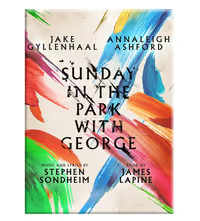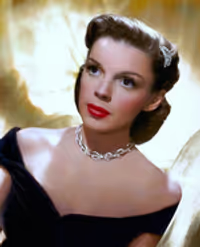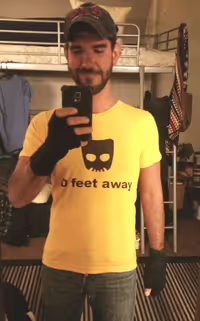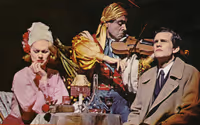Into the Woods Official Movie Thread
#4700Official Into the Woods Movie Discussion Thread
Posted: 1/2/15 at 1:39pm
Bucky
I'm pretty sure there are two beanstalks in the musical.
#4701Official Into the Woods Movie Discussion Thread
Posted: 1/2/15 at 1:46pm
I'm not sure if this was posted before, but I thought it was an interesting read.
The Dangerous Precedent Set With
#4702Official Into the Woods Movie Discussion Thread
Posted: 1/2/15 at 1:48pm
Icecream, seriously, why does it have to be one way or the other we feel about the Giant's Wife.
The Giant's Wife has been robbed and her husband has been killed.
By someone whom she embraced as a guest in her home.
She's pissed.
She wants revenge.
She wants the boy.
She's not being given him.
She's enraged.
She does horrible things.
She's doing what humans have done throughout the centuries in both legend and reality.
Think the Trojan War. Mass war and destruction of a civilization over the abduction of one woman, Helen.
Still, we don't think of Achilles and the Greeks as being other than people, now do we? Or feel bad because they are human, not monsters? In fact, we are meant to feel for both them and the Trojans.
Hell, you don't even need to go that far.
Jack himself is a thief and a murderer. He's still recognizably human.
I'm sorry if this sounds demeaning, but you seem to be looking at this story as if it were a simplistic good -v- bad conflict. It's not. Nor is it meant to be. It's meant to be as challenging as life itself.
We can still feel sympathy for Jack at the same time we strongly condemn his actions.
We can still feel sympathy for the Giant's Wife at the same time we strongly condemn her actions.
We can relate to the community not wanting to turn this little boy over to be killed.
We can relate to the Giant's Wife in her rage.
We can relate to being alive.
#4703Official Into the Woods Movie Discussion Thread
Posted: 1/2/15 at 2:07pm
Awesome link, Jordan.
"Despite the damage control that Marshall, Lapine and even Sondheim are doing regarding this, it’s very clear that the decision to make this change was Disney’s. There was no way that a character that is also included in their Disney Princess Gallery was going to trampled by a giant. I can imagine that the only reason why Sondheim was okay with this was because he’s over 80 years old and this is the only chance he’ll ever see this musical on screen. I bet that 20 years ago, there is no way Sondheim would ever allow this to happen.
What this change represents is a movie studio having the right to change important plot points for musicals to fit their ideals and philosophies. Say what you want about Les Miserables but Eponine and even Gavroche still die. I have no problem with songs being cut to fit for time but changing the plot is where I draw the line."
Could not agree more.
“In the original stage musical, Rapunzel’s mother (the Witch) banishes her to the desert. There she gives birth to the Prince’s twins, alone. Eventually, the blinded Prince finds her; she heals him with her tears, and they reunite. But the damage is already done, and Rapunzel’s journey has driven her insane. Back in the enchanted kingdom, her madness sends her screaming and weeping through the woods, where she’s eventually trampled to death by the Giant. And this all happens right in front of her mother.”
By not killing Repunzel, the entire point of the “Witches Lament” is lost, making the character far less dimensional. “Witches Lament” is a brutal and chilling moment. Woerner goes on,”The Witch isn’t necessarily upset with her past decision to imprison her daughter. The Witch is struggling with her grief and her own stubbornness. She’s not singing about how she should have been a better Mother; she’s singing about how she tried to protect the one she loved the most and failed.” It’s a ballad of delusion and grief.
It’s too bad this was changed because Streep would have crushed this scene. She does an admirable job with the new direction but it is definitely an opportunity lost. Even her best moment, “Last Midnight”, loses a bit of its power because of the script change."
100 percent
#4704Official Into the Woods Movie Discussion Thread
Posted: 1/2/15 at 2:19pm
Once again, I didn't see the change as throwing off the Witch's lament at all.
She's been rejected and abandoned by her child.
She has been rejected and abandoned by the only person she loves.
Her restored beauty can not help her.
Her powers are gone.
No one listens to her.
She is alone.
And she is in danger of being killed by a Giant.
I find her grief just as believable and palpable as if Rapunzel were actually dead.
On top of which, even with Rapunzel not dying, many are still saying, as they have for decades, that the end of the story is too much of a jarring downer.
Disney, Lapine and Marshall struck a balance. Of course sometimes striking a balance means that no one is happy with the results.
But that's not the case here.
Sure some think the movie is objectionably sanitized, although I don't find their arguments at all persuasive.
Some think the movie is far too dark, but, again, people have always had this complaint about Into the Woods.
But many others, like myself, think it all works wonderfully well. Including some of us, long fans of the musical, who accept the alterations as judicious ones which sacrifice very little - if any - of the libretto's grit and power.
Updated On: 1/2/15 at 02:19 PM
#4705Official Into the Woods Movie Discussion Thread
Posted: 1/2/15 at 2:26pmI don't know, the way the music is somber when Rapunzel and her Prince leave on their horse with the Witch trying to warn her of the Giantess leaves a grim ending for the both of them in my view.
#4706Official Into the Woods Movie Discussion Thread
Posted: 1/2/15 at 2:35pm
I think it would have been cool to hear the reactions in the audience when Rapunzel gets stomped to death. Would have brought the film to a whole other level in my opinion.
Henrik, you make great points and I would be more inclined to agree with more of them if I didn't know WHY they chose to keep Rapunzel alive. It was a coward decision not based on merit. Had nothing to do with art or the film. It was just Disney covering their backs and to me that's disappointing.
If Sondheim had come out and said "Oh yes we didn't kill Rapunzel cause we wanted to look at a different prospective from blah blah blah". But it wasn't that. It was a decision made out of fear from Disney.
Len6677
Chorus Member Joined: 12/16/14
#4707Official Into the Woods Movie Discussion Thread
Posted: 1/2/15 at 2:43pm
"I can imagine that the only reason why Sondheim was okay with this was because he’s over 80 years old and this is the only chance he’ll ever see this musical on screen. I bet that 20 years ago, there is no way Sondheim would ever allow this to happen."
I get the sense that Sondheim actually doesn't care that much about Rapunzel surviving, now or 20 years ago. I mean, I read that he was fine with that script from the '90s, and even the Baker's Wife survives in that. Rob Marshall has said that both Sondheim and Lapine were quite willing to make changes, and that he was actually the one who was fighting the hardest against changes.
As a big fan of the show for 20+ years, I was nervous about the changes like everyone. But I had absolutely no issue with Rapunzel surviving once I saw the movie. It was handled well. Her death works on stage and makes the story more powerful. On film it would have sent the chaos over the edge and only resulted in more members of the general movie-going audience hating this movie than already do. Whether it lessens the story for you or not, I'm not sure how anyone can really question the decision that was made.
#4708Official Into the Woods Movie Discussion Thread
Posted: 1/2/15 at 2:50pm
Yeah, Sondheim has never struck me as a strict non-compromiser. All of his early lessons came from longtime industry professionals who taught him the necessity and value of compromise, starting with Oscar Hammerstein. He's a realist. Realists can be great artists, too.
Gothampc
Broadway Legend Joined: 5/20/03
#4709Official Into the Woods Movie Discussion Thread
Posted: 1/2/15 at 2:51pm
"In what way is it not explicit that it was the Giant's Wife that kills the Baker's Wife in the movie, Goth? Whom exactly are we supposed to think did kill the Baker's Wife if not the Giant's Wife?"
Correct me if I'm wrong because I've only seen the movie once and all that pollen flying around in every scene made it hazy.
IIRC, the Baker's Wife hears the giant's wife coming. You see the Baker's Wife and then they cut to another scene. Later the news comes that the Baker's Wife was found at the bottom of a cliff. You don't actually see a death. When I saw the movie, I thought it was alluding to the idea that the Baker's Wife got scared and ran in the wrong direction and fell off a cliff.
Correct me if I'm wrong, but in the original Broadway show, didn't the audience actually see Joanna Gleason fall to the ground as the giant stomped through? There was no doubt she was killed by the giant.
#4710Official Into the Woods Movie Discussion Thread
Posted: 1/2/15 at 2:54pm
I actually like that we are left with Rapunzel and her prince as foils to Cinderella and hers. Rapunzel's Prince is presented here as, at least potentially, more sincere than his brother, and potentially more faithful in love. No, we don't know that they will survive. But they have a chance. Rapunzel and her prince offer us a happy ever after that we can have at least some degree of faith in; as if the movie was saying that everyone's path is different.
It's different than the show. But it could have worked on stage as well without altering any of the core themes of the libretto. Just because we don't see Rapunzel and her Prince making the mistakes that people do, doesn't mean that they might not make them - they too are human. On the other hand, having a more traditional fairy tale ending for them (in theory!) doesn't take away from the conflicts and neuroses of the other characters; if anything, it arguably provides contrast and lends depth and perspective.
Updated On: 1/2/15 at 02:54 PM
#4711Official Into the Woods Movie Discussion Thread
Posted: 1/2/15 at 2:57pm
I don't buy that Rapunzel dying would have turned audiences off to the film. It probably would have been more fun for the parents to watch. I don't know how little kids would have reacted, probably not as bad as many of you are thinking. Either way, it's not a film for kids anyway but obviously with Disney producing it...It just leads me back to my thinking that Disney had no business getting involved with this film in the first place.
On a side note: I've also never gotten the impression that Sondheim really cares how his works are treated on film. He's too soft for my taste.
indytallguy
Broadway Star Joined: 7/13/08
#4712Official Into the Woods Movie Discussion Thread
Posted: 1/2/15 at 3:50pm
Pretty sure what it shows is the original creators of the work willing to go along with the movie studio's requested (demanded) changes. This is hardly a unique situation for Into the Woods.
Sondheim and Lapine, of course, could have said no way and found someone else to make the movie, raised the money and made it themselves, or simply allowed it not to be made. Disney may be the initiator of the change, but others always had the option to stop it if they felt their story was being taken hostage or damaged in irreparable ways.
#4713Official Into the Woods Movie Discussion Thread
Posted: 1/2/15 at 4:14pm
I think there is a lot of irony to be found in how the tables have turned between Into the Woods and The Phantom of the Opera. Phantom proved to be the much bigger box office hit than ITW and ended up winning Best Musical at the Tonys. However, in the medium of film ITW will end up surpassing Phantom at least three-fold and is garnering better critical and awards reception.
Don't forget the ultimate revenge: when the movie version of Chicago became a smash hit and was nominated for 13 Academy Awards and won 6, including Best Picture.
Meanwhile, the film of A Chorus Line was a major flop in every way.
Vita, dulcedo, et spes nostra
Salve, Salve Regina
Ad te clamamus exsules filii Eva
Ad te suspiramus, gementes et flentes
O clemens O pia
Phyllis Rogers Stone
Broadway Legend Joined: 9/16/07
#4714Official Into the Woods Movie Discussion Thread
Posted: 1/2/15 at 4:23pm
I've seen multiple reviews saying that it's a story where the protagonists are vile murderers.
Please link at least three.
#4715Official Into the Woods Movie Discussion Thread
Posted: 1/2/15 at 4:26pm
I definitely got the impression hardly any time at all had passed. And that just adds to the way they glossed over everyone's discontent.
As for that article, it's hardly a "precedent" the film is setting. The article even notes the biggest precendent, LITTLE SHOP OF HORRORS (though I bet there were others before even it). I also don't like how it tries to discredit the opinions of anyone who wasn't bothered by Rapunzel not dying.
Phyllis Rogers Stone
Broadway Legend Joined: 9/16/07
#4716Official Into the Woods Movie Discussion Thread
Posted: 1/2/15 at 4:46pm
Like Mr. Nowack says, I don't see what kind of precedent is being set in the first place, let alone what makes it dangerous. I'm also of the mind that Sondheim would have let Rapunzel live 20 years ago (there was just a discussion the other day about the 90s film script where the Baker's Wife lives, so I can't imagine he'd have been to precious about Rapunzel back then). That piece is just vague histrionics about nothing. No one thinks the Lament is "chilling." I just can't take a piece seriously that refers to it as one of the ten best movie musicals of all times all the while by portending it foreshadows a pox on all future movie musicals.
I get that Into the Woods is a show that means a lot different of things to a LOT of different people, but there seems to be some kind of underylying theme with a lot of people (and not just here) that this is text is so sacrosanct and shouldn't have been altered at all, when in fact, as stage to screen adaptions go, it's pretty faithful, despite the loss of a few songs and deaths.
People are of course entitled to feel how they feel about the result. I think that Dreamgirls was a travesty given what could have been from the source material, but the consolation to me is that even though it was well-received, it's pretty much forgotten from people's consciousness. Even Jordan's link, which mentions almost eveyr musical made since the new millennium, ignore it. And I get the author's feeling about being misled by filmmakers, because Bill Condon kept repeating that only one song was cut from Dreamgirls, but that was only true if you were only counting the songs that made it to the OBC recording, and even then that was still a reach to say.
I saw the film again today, and I liked it more the second time. I even thought It Takes Two was right to be kept (I was thinking it slowed the movie down originally). I still think Giants in the Sky would have benefited for more elaborate flashbacks then just ones of Jack going up and then down the beanstalk. The only change that stuck out today was that all the lyrics that were excised from "No One is Alone" are all the lyrics that really drive the message that that song is about community responsibility and how the actions of one can affect the lives of many.
Updated On: 1/3/15 at 04:46 PM
#4717Official Into the Woods Movie Discussion Thread
Posted: 1/2/15 at 5:09pm
"I actually like that we are left with Rapunzel and her prince as foils to Cinderella and hers. Rapunzel's Prince is presented here as, at least potentially, more sincere than his brother, and potentially more faithful in love. No, we don't know that they will survive. But they have a chance. Rapunzel and her prince offer us a happy ever after that we can have at least some degree of faith in; as if the movie was saying that everyone's path is different."
That's what I got from it, too. In the play the princes are exactly alike, two handsome scumbags in a pod. Making them different personalities in the movie gives it a little more texture IMO; and it gives the audience a chance to see that, at least, there are two characters who come out of the woods relatively happy.
Cinderella's prince is vain, self-centered, selfish and shallow; he ends up alone.
Rapunzel's prince is earnest, kinda goofy, determined and devoted to Rapunzel; he gets at least a shot at a happy ending.
And the witch is still pissed off for the same reasons she was in the stage play: the outside world has, once again, screwed up her life. It's a different path, but it gets to the same place, at least IMO.
Len6677
Chorus Member Joined: 12/16/14
#4718Official Into the Woods Movie Discussion Thread
Posted: 1/2/15 at 5:25pm
Gothampc, in the original show you hear the footsteps, then a slightly raised platform cracks apart and the BW falls off the back of it. You hear the giant, but I don't think anything is shown or said that indicates she is necessarily stomped on. I didn't think the movie scene was any less explicit than the stage scene. In both versions it's possible she might have died just from the fall.
Which goes back to the idea being discussed earlier of the giantess not really being a villain bent on murdering everyone. She only wants Jack and says she will leave once she gets him. In the stage version the narrator even says she is nearsighted and without her glasses, which implies that she really has no awareness who she is killing by stomping around the kingdom. The only person she could be accused of purposefully killing is the narrator, since she drops him when she realizes he's not Jack (but even then, she didn't single him out in the first place. She was tricked into thinking he's Jack).
Phyllis Rogers Stone
Broadway Legend Joined: 9/16/07
#4719Official Into the Woods Movie Discussion Thread
Posted: 1/2/15 at 5:34pm
In the play Jack says he found her under a tree, presumably under the trees that dropped in the projection as she rolled off the platform.
Updated On: 1/2/15 at 05:34 PM
#4720Official Into the Woods Movie Discussion Thread
Posted: 1/2/15 at 8:37pm
I saw the film today, and I liked it more the second time. I even thought It Takes Two was right to be kept (I was thinking it slowed the movie down originally).
I felt like the relationship between these two was handled poorly. At the begging of Act 1, its basically falling apart. It is stale and life less. They do love each other but they can't connect. They are in desperate need of couples therapy…and they get it when they go into the woods.
If this is made clear at the start, it makes "it takes two" incredibly powerful. Because the riff between the baker and his wife wasn't as significant in the movie, it turned it into just a cute song they sing.
James Corden made the baker too much of a "nice guy". In the play he's kind of a jerk, constantly belittling his wife and telling her what to do. Because he was played so soft we didn't get to see his arc through the entire show. He grows from being impulsive, insecure and selfish into a strong, compassionate father figure.
The film turns a super complicated adult relationship into one that is shallow and superficial.
Vita, dulcedo, et spes nostra
Salve, Salve Regina
Ad te clamamus exsules filii Eva
Ad te suspiramus, gementes et flentes
O clemens O pia
#4721Official Into the Woods Movie Discussion Thread
Posted: 1/2/15 at 8:40pmThe HELLO, LITTLE GIRL scene is on Youtube (Obviously not going to post it). The scene is actually not that creepy. The candy part is the worst part. Oh, the theme is clearly there. But, if you’re like 5, you won’t get what’s going on.
Starship
Broadway Star Joined: 7/29/12
#4722Official Into the Woods Movie Discussion Thread
Posted: 1/2/15 at 8:45pmaccidental double post Updated On: 1/2/15 at 08:45 PM
Starship
Broadway Star Joined: 7/29/12
#4723Official Into the Woods Movie Discussion Thread
Posted: 1/2/15 at 8:46pmI thought the Hello, Little Girl scene was definitely creepy. My friend (who was not familiar with the show before seeing the movie) said that he definitely felt very, very, very uncomfortable during that number. As for me, the candy part wasn't the creepiest, it was definitely the beginning when he's peering over at Red and commenting on how "delicious" she'd be. That just sat very uncomfortably with me. Well done, but very unsettling.
Showface
Broadway Legend Joined: 6/25/14
#4724Official Into the Woods Movie Discussion Thread
Posted: 1/2/15 at 8:46pm
Saw it again, and it was even better! I found it perfect, and had no issues whatsoever!
"James Corden made the baker too much of a "nice guy". In the play he's kind of a jerk, constantly belittling his wife and telling her what to do. Because he was played so soft we didn't get to see his arc through the entire show. He grows from being impulsive, insecure and selfish into a strong, compassionate father figure.
The film turns a super complicated adult relationship into one that is shallow and superficial."
Couldn't disagree more...I found there relationship handled excellently! Is it different? Yes. Corden and Blunt portray their "Bakers" differently then Zien and Gleason. I actually felt like Corden and Blunt loved eachother which brought something out in It Takes Two that hasn't been brought out before. I never loved that number...now it is one of my favorites! I also felt more for the Baker for the first time when his wife died, because you see how much he loved her in this, and how much she loved him. His struggle is not his relationship with his wife, as he seems to be a pretty good husband, but he is still haunted by his father's abandonment of him... he is struggling to become a good father he wants to be, and when his wife dies, he loses the person he relied on, and the love of his life.
Please Start a New Thread!
Videos









